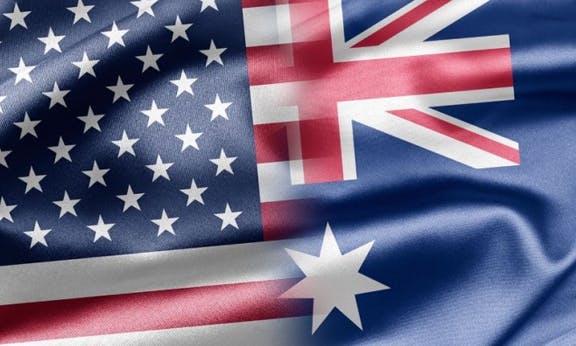Trash the US alliance

The Greens in the Senate in early February again attempted to force a debate on the Australia-US alliance. Party leader Richard Di Natale secured a suspension of standing orders to launch an attack on US president Donald Trump, describing him as “dangerous, unhinged … and hateful”. Following Di Natale, Tasmanian senator Nick McKim said: “[T]he US is in danger of slipping into a state of early-onset fascism. And there’s every chance that we are actually witnessing the early stages of a coup in the United States”.
The Liberal-Labor dominated chamber thought most of this preposterous. But the Greens are right to seize this moment, as they did in November after the election of Trump, to pick a fight about the US alliance. The far-right cabal surrounding the commander-in-chief of the world’s most powerful imperialist state are poisonous reactionaries, and the president is a clear and present danger. Trump and his coterie want to upset existing conventions and relationships, and rewrite the book on how, to what extent and to what end the executive branch of the US government can deploy its power against enemies real, perceived or made up.
What makes the situation dangerous is that, with events spiralling out of its control, the administration is seemingly desperate for enemies while being light on friends. Many, if not most, congressional Republicans believe that Trump’s leadership of their party was a hostile takeover. The White House’s alliance with the Republican congressional majority contains many contradictions and fissures that have been only papered over while lawmakers take advantage of the two-year window of legislative-executive hegemony of the conservatives.
White House staff loyal to the Republican machine and unnerved by Trump and his chief strategist Steve Bannon have been leaking like a sieve to the media the president has waged war on. On top of that, it would be an understatement to say that Trump has an uneasy relationship with the media, sections of the state and the ruling class.
So in the midst of the greatest Republican federal and state legislative dominance since the 1920s, there is chaos at the top. If it continues, temporary alliances could be severely tested while the president increasingly could appear a liability to the Republican agenda and in a politically weak position.
The problem is that he is far from in a weak position institutionally. The office of the president enjoys significant independence. The authoritarian and repressive powers that it can mobilise are far stronger than 140-character Twitter tantrums. And they are more damaging when used to impose the authority of the White House, either domestically or internationally.
Trump already lashes out every second day – about the media, the polls, the judiciary, the protesters, Saturday Night Live, the intelligence services. How will this petulant scrapper vent his frustrations if political defeats or interminable delays and legal challenges, such as the judicial overruling of the travel ban, begin to pile up?
It was both ominous and odious when Trump adviser and spokesperson Stephen Miller warned, after that federal ruling: “The end result of this … is that our opponents, the media and the whole world will soon see, as we begin to take further actions, that the powers of the president … are very substantial and will not be questioned”.
Imperialist war is the product of relentless economic and geopolitical competition transforming into military conflict; it represents the heightening of contradictions within the broad workings of impersonal forces beyond anyone’s command. Today, compared with 14 years ago when the US invaded Iraq, global economic and geopolitical tensions are heightened by the problems of the eurozone, the carnage in the Middle East, the expansionism of China and Russia and the spectre of a trade war under Trump.
Yet any war also requires the decisive intervention of political actors and the state. Trump and his inner circle are unpredictable, extremist and have given all indications of acting unilaterally.
We cannot rule out that the Australian government will, in its usual hawkish way, rush to join any conflict that the US starts. But even if no large-scale invasion of another country eventuates, Di Natale was right to savage the government and the opposition in the Senate for their policy of appeasing an openly reactionary and authoritarian president. Gesturing to the Labor benches, he referred to ALP senators as “lickspittles and sycophants to the US”.
There is a fight going on, in the US and around the world, against moves by establishment politicians to legitimise and accommodate to the ideas and policies of the far right – militarism, ultra-nationalism, extreme Islamophobia and authoritarianism. The Greens taking a stand on this issue can help build the sort of protest movement we need in Australia against Trump and his admirers such as Pauline Hanson, Cory Bernardi and the right wing of the Liberal Party.